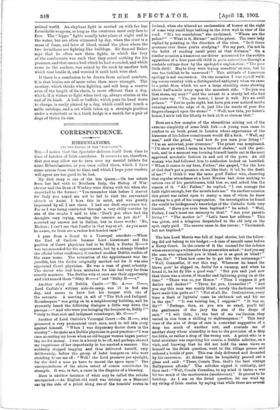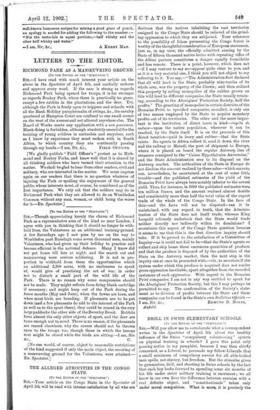CORRESPONDENCE.
HIBERNIANISMS.
[TO THE EDITOR OF THE "SPECTATORn
SIR,—I notice that the Spectator delivers itself from time to time of batches of Irish anecdotes. It occurs to me, therefore,
that you may allow me to 'turn over my mental tablets for some Hibernianisms, as you once called them, which I have come across from time to time, and which I hope your readers Will agree are too good to be lost.
My first story is one of the late Queen :— On her return from her last visit to Northern Italy, the Bishop of Win-
chester and the Dean of Windsor were dining with her when she remarked to the former : "You remember that before I started for Italy you urged me not to fail to visit the conventual church at Assisi. I bore this in mind, and was greatly impressed by all I saw there. I had one droll experience too. For as I was being conducted through a very chilly corridor by
one of the monks I said to him : 'Don't you often feel the draughts very trying, wearing the tonsure as you do ? ' I received my answer not in Italian, but in these words : 'No, Madam; I can't say that I suffer in that way at all. As you must be aware, we Irish are a rather hot-headed race.' " 1 pass from a Regal to a Viceregal anecdote :—When the Earl of Carlisle became Lord - Lieutenant and the position of Court physician had to be filled, a Doctor H—s was recommended for the appointment, but by a strange blunder
the official letter confirming it reached another Dublin medico of the same name. The revocation of the appointment was im- possible, but the doctor originally marked out for it was also appointed Court physician. He was a man of great urbanity. The doctor who had been mistaken for him had very far from courtly manners. The Dublin wits at once saw their opportunity and nicknamed them "Silky H—a" and "Sulky H—s."
Another story of Dublin Castle :—" Mr. A— C , Lord Carlisle's wittiest aide-de-camp, was ill in bed one day, and seems to have lost his temper with one of the servants. A meeting in aid of "The Sick and Indigent Roomkeepers " was going on in a neighbouring building, and he presently beard the following dialogue a little way down the passage :—" And who were you bringing the brequest to, Biddy ? " "Only to that sick and indignant roomkeeper, Mr. C—."
Another of Lord Carlisle's Viceregal Court :—Dr. H—, who possessed a very pronounced snub nose, used to tell this story against himself. " When I was dispensary doctor down in the country "—he spoke as a Dublin physician in good practice—"I was once mounting my horse when an old beggar woman began pester-
ing me for money. I was in a hurry to be off, and perhaps showed
my impatience of her importunity in too marked a manner. She suddenly stopped begging and thus delivered herself, very deliberately, before the group of hotel hangers-on who were standing to see me off : "Well ! the Lord preserve yer eyesight, for the divil a nose ye have to mount the specs upon." The unexpectedness of the above retort of course constitutes its strength. It was, in fact, a curse in the disguise of a blessing.
Here is another instance of what may be called the rebuke unexpected :—An English old maid was driving on a Bianconi car by the side of a priest along one of the tourists' routes in Ireland, when she uttered an exclamation of horror at the sight of some very small boys bathing in the river well in view of the road. " It's too scandalous," she exclaimed. " Where are the police?" " What is it, Ma'am?" said the priest. The irate lady replied by pointing in the direction of the river. "Is it those gossoons over there you're studying ? For my part, I'm not in the habit of reading small print at that distance." On a similar occasion a humorous car-driver accounted for the sudden apparition of a four-year-old child in puris naturalibes through a roadside cottage door by the apologetic explanation : "The poor little divil! Maybe they were trying somethin' on him, but he was too ticklish to be measured !" This attitude of humorous apology is not uncommon. On one occasion I was myself walk- ing across country with a distinguished antiquary when we came to a point from which we saw a large standing stone showing about half-a-mile away upon the mountain aide. " Do you see that stone, my man ? " said the savant to a sturdy lad who had just come up. " Yis, yer honor, I know it well. It's an owld galloun." "You're quite right, but have you ever noticed marks running across the edge of it, just like the marks of your five fingers stamped upon the stone ? " " Well, now thin, yer honor's honor, I nivir tuk the liberty to look at it so close as that."
Here are a few samples of the absurdities arising out of the extreme simplicity of some Irish folk :—A young man came to confess to an Irish priest in London whose experiences of the humours of his fellow-countrymen would fill a book. " Well, my man," said the priest, "and how do you earn your living ? " " I'm an acrowbat, your riverence." The priest was nonplussed. "I'll show ye what I mean in a brace of shakes," said the peni- tent, and in a moment was turning himself inside out in the most approved acrobatic fashion in and out of the pews. An old woman who had followed him to confession looked on horrified. " When it comes to my turn, Father," she gasped, "for the love of God don't put a penance on me like that; it 'ud be the death of me !" I think it was the same good Father who, observing that regular attendance at a Lent Mission had done nothing to reform one of his parishioners, told him so, and asked him the reason of it. " Ah! Father," he replied, "I can manage the faith right enough, but the morals bate me." On another occasion this priest was called upon to marry a man of whom he knew nothing to a girl of his congregation. On investigation he found the would-be bridegroom's knowledge of the Catholic faith very limited. " Have you even' been baptised ? " he asked. " Well, Father, I can't trust me memory to that." "Are your parents living ? " "The mother is." "Let's have her address." This was given, and a telegram despatched to the old lady on the spot, reply paid. The answer came in due course : " Vaccinated, but not baptised."
The late Lord Morris was full of legal stories, but the follow- ing did not belong to his budget :—A case of assault came before a Kerry Court. In the course of it the counsel for the defence when examining a witness for the prosecution asked : "And you say the man who assaulted you is blind, or is ae good as blind ? ' "Yes, Sir." "Then how came he to gat into the scrimmage ?" " Well, Counsellor, it wor this way. Wherever he heard the blows goin' he slipped in, feelin' for a vacancy, and when he found it, he let fly like a good wan." "But you said just now that there was a storm of thunder and lightning going on at the time." "There was so, yer Honor." "Then I suppose it got darker and darker ?" " Thrue for you, Counsellor !" " And you say this man was nearly blind; surely the darkness would have made him quite so ? " " Not at all, Sir. Contrariwise, every time a flash of lightnin' come he shthruck oat and hit me in the eye." " It was raining too, I suppose?" " It was so, Sir !" " Perhaps, then, as you are so exact, you'll tell the gentlemen of the jury the size of the drops of rain." "I will thin ; to the best of me rec'lleciion they varied in size from a shilling to eighteenpence !" This hazy view of the size of drops of rain is somewhat suggestive of a drop too much of another sort, and reminds me of another story whose absurdity is due to the provision of a drop too little, or rather a drop of the wrong sort. A priest who is a total abstainer was expecting his cousin, a Dublin solicitor, on a visit, and knowing that he did not hold the same views as himself on the Drink question, went to the village grocer and ordered a bottle of port. This was duly delivered and decanted by his reverence. At dinner time he hospitably poured out a glass and said : " There, Cousin Tom, that's the best vintage Ballyporeen affords." The solicitor sipped it critically, and then said : "Well, Cousin Cornelius, to my mind it tastes a wee bit too much of the mushernins (mushrooms)." It proved to be ketchup. As I am on the Drink question, let me wind up: my string of Irish stories by saying that while there are stmexal well-known humorous recipes for mixing a good glass of punch, no apology is needed for adding the following to the number :- a Mix the materials in equal portions,—half whisky and the other half whisky and water."











































 Previous page
Previous page